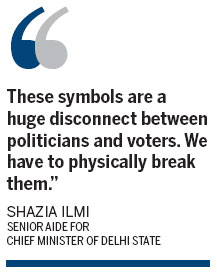Delhi state's leader battles age-old perks
For years, India's senior politicians have resided in the capital's most luxurious colonial-era bungalows, protected by gun-toting police and chauffeur-driven cars running red lights with sirens blazing - even if it was for a wife's shopping trip.
This was all shamelessly done while they were dressed in flowing cotton tunics and trousers, the dress code of any official wanting to associate themselves with the founding fathers of independence and the country's frugal Gandhian legacy.
Now, these symbols have come under attack after bespectacled former tax collector Arvind Kejriwal, head of the anti-corruption Common Man's Party, shocked India by becoming chief minister of Delhi state in local elections last month.
From eschewing guards, placing his safety in the hands of "God", to dressing in polyester shirts, Kejriwal has rejected these symbols of privilege enjoyed by a tiny minority of judges, civil servants and politicians in this city of 16 million people.
"When God decides otherwise, nobody can save you, whatever the number of bodyguards," he said.
Some politicians have begun to replicate him, but critics say the renunciations will soon backfire, so deeply ingrained are the privileges. It has already become a media obsession, with reporters following Kejriwal for any sign of slip-ups.
After his election - he traveled to his inauguration by a suburban metro train - Kejriwal refused to move into the bungalow reserved for the capital's chief minister.

But the media has jumped on his accepting a five-room ground-level apartment instead - still luxurious by Delhi's standards. His ministers have come under fire for accepting expensive official cars.
When Kejriwal recently attended a Sikh temple, his nondescript car arrived almost imperceptibly. There was no police guard or sirens. He sat in the front seat by his driver, unusual for politicians for whom back seats symbolize status.
The tiny blue and scratched Maruti-Suzuki sedan was parked uneasily next to a huge Toyota Land Cruiser with tinted windows and stickers proclaiming out-of-date VIP parking stickers.
"These symbols are a huge disconnect between politicians and voters," said Shazia Ilmi, one of Kejriwal's senior aides, as he toured the temple. "We have to physically break them."
"It's not just symbolic. They cost a lot of money."
Mindful of angry voters, some politicians now are copying Kejriwal. The chief minister of Rajasthan state, Vasundhara Raje, has refused an official residence and toned down her security detail.
However, Raje is a descendant of one of India's hugely wealthy former royal families, and her self-denial may not have the same effect.
Banning sirens on official cars was part of Kejriwal's campaign. For Indians tired of corruption scandals, the sight of cavalcades of white VIP cars with fluttering flags routinely causing traffic chaos had long jarred. Guards have been known to beat up attendants demanding that a VIP car pay road tolls.
"I've been driving for the past few days. I stop at all red lights. I don't think my time is wasted," Kejriwal told lawmakers.
Reuters
(China Daily 01/09/2014 page10)














